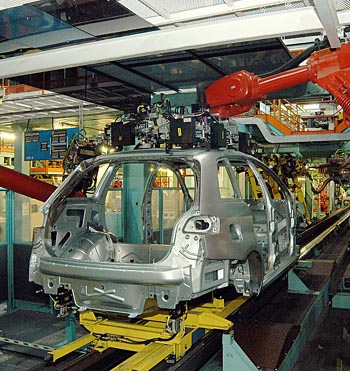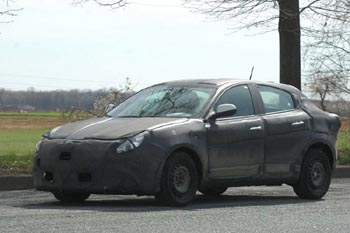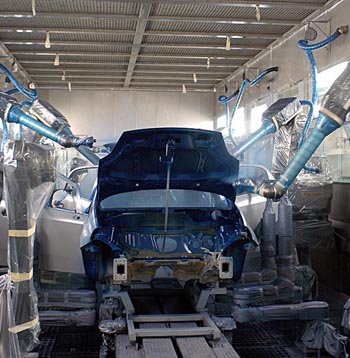 |
|
The Cassino
plant will see a continuation of the
existing production of the Fiat Bravo,
Lancia Delta and Fiat Croma with these three
joined by Alfa Romeo's new C-segment
contender. |
|
|
|
 |
|
Alfa Romeo's
highly critical replacement for the 147 in
C-segment (seen above during prototype
testing recently) will be based on the new
C-Evo platform and as such will be built
alongside the Fiat Bravo and Lancia Delta
which are based on the architecture it is
evolving from. |
|
|
|
 |
|
The Melfi
plant, home of the best selling B-segment
Fiat Grande Punto family, will continue to
build this key model alongside the
facelifted version (codenamed Punto EVO)
when it arrives. |
|
|
|
Fiat CEO Sergio
Marchionne outlined his medium term industrial plan for the
Group today, revealing that Pomigliano d'Arco (which will
get at least one new Alfa Romeo model line) and Termini
Imerese will both avoid the axe for the next couple of years
while confirming that the replacement for the Alfa 147 will
be built at Cassino and that Melfi will build the facelifted
Grande Punto. There has been mounting pressure on Fiat from
unions and the government to outline its medium-term plans
in light of the global economic downturn that has changed
the scenery and the thus-far abortive bid for Opel.
Fiat Group
Statement
At the meeting held
today at Palazzo Chigi with representatives of the Italian
government, local officials and trade unions, the Chief
Executive Officer of Fiat, Sergio Marchionne, outlined the
Groupís current situation and medium-term industrial plan,
with particular focus on its plants in Italy.
Fiat Group
Automobiles
During
the first five months of the year, Fiat Group Automobiles
recorded a modest 3.8 percent decline in sales in Western
Europe, where the overall market fell 12.8 percent. The
Groupís share of the market rose nearly one percentage point
to 9.3 percent. The global crisis has further aggravated the
problem of production overcapacity that has been plaguing
the automotive industry for years. For 2009, utilisation of
manufacturing capacity in Europe is expected to fall to
approximately 65 percent.
A
serious restructuring of the automotive industry is now
absolutely necessary if it is to be economically viable. The
operational, industrial and economic measures which Fiat has
employed to date are no longer sufficient by themselves.
Far-reaching strategic measures are necessary to achieve an
adequate level of critical mass, increase volumes produced
for each platform and expand geographic presence. The
alliance with Chrysler forms part of such a strategic
approach. The combination of Fiat and Chrysler has created
the 6 th
largest automaker worldwide.
For our plants
in Italy, a number of which have benefited from the
introduction of eco-incentives, the planned production
activities for 2009 and 2010 are as follows:
- Mirafiori:
production of Alfa MiTo confirmed with Multiair version to
be added in September 2009; production of Punto Classic,
Multipla, Musa and Idea to continue.
- Melfi:
production of new Punto EVO to begin; production of Grande
Punto confirmed.
- Cassino:
production of Bravo, Delta and Croma confirmed; production
of new C-segment Alfa Romeo to begin in 2010.
- Termini Imerese:
production of Ypsilon (with Euro 5 engine) confirmed until
2011; industrial presence to be maintained with
non-automotive production activities; necessary to review
Programme agreement on the basis of the new activities.
- Pomigliano d'Arco:
production of Alfa 159 sedan and Sportwagon (with Euro 5
engine) beyond 2010 confirmed; production of Alfa 147 and GT
confirmed for 2010; subsequent assignment of new platform
(for 1 or more models) planned.
- Sevel Val di Sangro:
production of Ducato confirmed.
Iveco
The
truck and commercial vehicle market is undergoing a period
of extreme difficulty. In the first quarter of this year,
demand fell nearly 40% in Western Europe, with declines in
all major markets at levels never before experienced. In
these extremely challenging conditions, Ivecoís market share
fell half a percentage point, partly due to its decision to
defend margins, with particularly negative performance for
heavy vehicles. Across Europe, all heavy vehicle
manufacturers experienced declines with the total volume of
new orders falling 80% over 2008 levels. Sales of light and
heavy vehicles for Iveco have been strongly impacted by the
decline in the overall market, with production at plants Ė
which will only run at about one-third of capacity this year
Ė being reduced as a consequence. The city bus segment,
which is strongly dependent on public-sector spending, is
experiencing a sharp contraction in orders (-40 percent in
Italy). This is also expected to lead to a significant drop
in production volumes in the second half of the year.
Current production activities are confirmed for the three
plants in Brescia (new Eurocargo), Suzzara (new Daily) and
Avellino (new Citelis and Domino buses).
CNH
Global
demand for construction equipment fell 57 percent in the
first quarter and was most pronounced in Western Europe.
Overall, sales for Case and New Holland were in line with
market performance. The Imola, Lecce and San Mauro plants
were significantly impacted by the sharp drop in demand.
Production volumes this year are expected to be at levels
which would be difficult to sustain. Workforce utilisation
for the first four months of the year was, on average, below
the 40 percent mark. Current market performance, medium-term
expectations and the significant under-utilisation of
production capacity necessitate a thorough reorganisation of
the business, rationalisation of existing production sites
and definition of a plan to manage redundancies.
The
global agricultural equipment market also saw negative
performance. For the first quarter of 2009, demand for
tractors and combine harvesters fell 10 percent and 23
percent, respectively. Case IH and New Holland performed in
line with the market. This business has maintained
production levels for larger models, but is experiencing a
significant reduction in volumes for its lower horsepower
tractors produced at the Jesi plant. Market declines are
expected to have an even greater impact on production levels
in the second half of the year. The plantís production
activities have been confirmed.
During
the meeting, Fiatís CEO, Sergio Marchionne, said: "At
today's meeting, we provided a realistic overview of the
current situation. Fiat has no intention of hiding from the
crisis. We are confronting it head on, leveraging our
strengths and resources to the full to overcome it. We are
prepared to take full advantage of opportunities that may
present themselves. But the time has also come for everyone
to acknowledge that significant milestones can only be
achieved by joining forces. Maintaining equilibrium in
employment levels in the face of these extremely difficult
market conditions is no easy task. The production-related
initiatives that we outlined today will contribute in part
to achieving this target, but they also need to be
financially viable. At the same time, there are other
contributing elements which are equally important, such as:
being able to rely on eco-incentives in Europe that are
truly effective in stimulating demand; having continued
access to temporary layoff schemes ( Cassa
Integrazione Ordinaria e Straordinaria), indispensable
tools for managing temporary production stoppages and
reorganisations, which current demand levels have made
unavoidable; and, rigorous containment of overhead costs and
the ability to respond to changes in market conditions in a
timely manner. This not only requires the ability to enact
work flexibility rules, but also an awareness of the fact
that the only result of disproportionate conflictual action
is to damage us all by creating opportunity for our
competitors."
In his
closing remarks, Mr. Marchionne stated: "We have a
conviction which is also an invitation. A Fiat without
strong roots in Italy would be unimaginable. We have said
this for years. Fiat is part of this nation. It has been an
important part of its history and we want it to continue as
an important part of its future. If we are in agreement on
this common objective, now is the time to join forces.
Government, trade unions and company. If we all take a step
forward rather than backward, if each of us is prepared to
assume his share of responsibility and commitment, then all
will be possible. We will be able to avoid painful
consequences and build something which is more solid and
long-lasting. I personally believe this challenge is within
our reach."
|